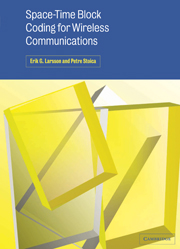Book contents
- Frontmatter
- Contents
- ABOUT THE AUTHORS
- PREFACE
- NOTATION
- COMMONLY USED SYMBOLS
- ABBREVIATIONS
- 1 INTRODUCTION
- 2 THE TIME-INVARIANT LINEAR MIMO CHANNEL
- 3 MIMO INFORMATION THEORY
- 4 ERROR PROBABILITY ANALYSIS
- 5 RECEIVE DIVERSITY
- 6 TRANSMIT DIVERSITY AND SPACE-TIME CODING
- 7 LINEAR STBC FOR FLAT FADING CHANNELS
- 8 LINEAR STBC FOR FREQUENCY-SELECTIVE CHANNELS
- 9 COHERENT AND NON-COHERENT RECEIVERS
- 10 SPACE-TIME CODING FOR INFORMED TRANSMITTERS
- 11 SPACE-TIME CODING IN A MULTIUSER ENVIRONMENT
- A SELECTED MATHEMATICAL BACKGROUND MATERIAL
- B THE THEORY OF AMICABLE ORTHOGONAL DESIGNS
- REFERENCES
- INDEX
PREFACE
Published online by Cambridge University Press: 31 October 2009
- Frontmatter
- Contents
- ABOUT THE AUTHORS
- PREFACE
- NOTATION
- COMMONLY USED SYMBOLS
- ABBREVIATIONS
- 1 INTRODUCTION
- 2 THE TIME-INVARIANT LINEAR MIMO CHANNEL
- 3 MIMO INFORMATION THEORY
- 4 ERROR PROBABILITY ANALYSIS
- 5 RECEIVE DIVERSITY
- 6 TRANSMIT DIVERSITY AND SPACE-TIME CODING
- 7 LINEAR STBC FOR FLAT FADING CHANNELS
- 8 LINEAR STBC FOR FREQUENCY-SELECTIVE CHANNELS
- 9 COHERENT AND NON-COHERENT RECEIVERS
- 10 SPACE-TIME CODING FOR INFORMED TRANSMITTERS
- 11 SPACE-TIME CODING IN A MULTIUSER ENVIRONMENT
- A SELECTED MATHEMATICAL BACKGROUND MATERIAL
- B THE THEORY OF AMICABLE ORTHOGONAL DESIGNS
- REFERENCES
- INDEX
Summary
The book in hand is the result of merging an original plan of writing a monograph on orthogonal space-time block coding with the ambition of authoring a more textbook-like treatment of modern MIMO communication theory, and it may therefore have the attributes of both these categories of literature. A major part of the book has resulted from the development of graduate courses at the universities where the authors are active, whereas a smaller part is the outcome of the authors' own research.
Our text covers many aspects of MIMO communication theory, although not all topics are treated in equal depth. The discussion starts with a review of MIMO channel modeling along with error probability and information theoretical properties of such channels, from which we go on to analyze the concepts of receive and transmit diversity. We discuss linear space-time block coding for flat and frequency selective fading channels, along with its associated receiver structures, both in general and in particular with emphasis on orthogonal space-time block coding. We also treat several special topics, including space-time coding for informed transmitters and space-time coding in a multiuser environment. Furthermore we include material about the existence and design of amicable orthogonal designs, a topic which is relevant in the context of orthogonal space-time block coding.
The text focuses on principles rather than on specific practical applications, although we have tried to illustrate some results in the context of contemporary wireless standards.
- Type
- Chapter
- Information
- Space-Time Block Coding for Wireless Communications , pp. xiii - xivPublisher: Cambridge University PressPrint publication year: 2003



